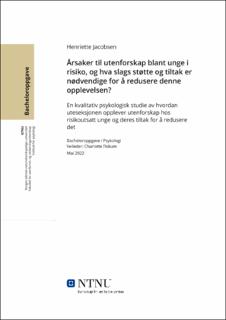Årsaker til utenforskap blant unge i risiko, og hva slags støtte og tiltak er nødvendige for å redusere denne opplevelsen?
Bachelor thesis

Permanent lenke
https://hdl.handle.net/11250/3075802Utgivelsesdato
2023Metadata
Vis full innførselSamlinger
- Institutt for psykologi [3086]
Sammendrag
Risikoutsatte unge som opplever utenforskap, kan oppleve uheldige konsekvenser både på kort og lang sikt. Dette kan inkludere redusert psykisk helse, økt risiko for rusmisbruk og kriminalitet samt svekket tilknytning til utdanning og arbeidsliv. Derfor er det viktig å undersøke årsakene til utenforskap blant risikoutsatt unge og hvilke tiltak som kan redusere denne følelsen. Følgende problemstilling ble: «Årsaker til utenforskap blant unge i risiko, og hva slags støtte og tiltak er nødvendige for å redusere denne opplevelsen?». En kvalitativ metode ble benyttet i denne oppgaven med semistrukturerte intervjuer av elleve ansatte i uteseksjonen i Norge. Tematisk analyse ble utført og tre hovedtemaer ble identifisert: «Utenforskap», «Tiltak» og «Utfordringer». Resultatene ble analysert i lys av begrepet «risikovurdering», «reguleringsstøtte» og modellen «toleransevinduet». Funnene indikerer at følelsen av utenforskap skyldes en kompleks interaksjon mellom personlige, sosiale, økonomiske og kulturelle faktorer. Informantene identifiserte også politiske utfordringer og mangler i systemet som hindrer dem i å implementere tiltak. Samt utfordringer ved å møte risikoutsatt unge tidlig nok. Resultatene viser at det er et sterkt engasjement for å møte unge på deres sårbarheter, men at det fortsatt er utfordringer som må adresseres for å oppnå bedre resultater. At-risk youth who experience a feeling of exclusion can have negative consequences in both the short and long term. These can include reduced mental health, an increased risk of substance abuse and criminal activity, as well as a weakened connection to education and the workforce. It is therefore important to investigate the causes of exclusion among vulnerable young people and identify measures that can reduce this experience. The research question for this study was: "Reasons for exclusion among vulnerable youth and what support and measures are needed to reduce this experience?". A qualitative method was used in this study, using semi-structured interviews with eleven employees from various outreach social work in Norway. A thematic analysis was carried out, and three main themes were identified: "Exclusion", "Measures" and "Challenges". The results were analyzed in light of the concepts of "risk assessment", "regulatory support" and the "tolerance window" model. The findings suggest that feelings of exclusion are due to a complex interaction between personal, social, economic and cultural factors. The informants also identified political challenges and shortcomings in the system that prevented them from taking action. The results show a strong commitment to tackling young people's vulnerability, but there are still challenges that must be dealt with in order to achieve better results.